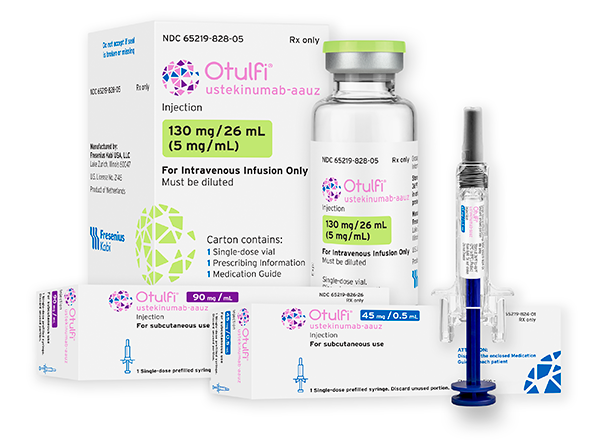Important Safety Information for OTULFI® (ustekinumab-aauz) – HCP
OTULFI (ustekinumab-aauz) is contraindicated in patients with clinically significant hypersensitivity to ustekinumab products or to any of the excipients in OTULFI (ustekinumab-aauz).
Infections
Ustekinumab products may increase the risk of infections and reactivation of latent infections. Serious bacterial, mycobacterial, fungal, and viral infections were observed in patients receiving ustekinumab products.
Serious infections requiring hospitalization, or otherwise clinically significant infections, reported in clinical trials included the following:
- Plaque psoriasis: diverticulitis, cellulitis, pneumonia, appendicitis, cholecystitis, sepsis, osteomyelitis, viral infections, gastroenteritis, urinary tract infections
- Psoriatic arthritis: cholecystitis
- Crohn’s disease: anal abscess, gastroenteritis, ophthalmic herpes zoster, pneumonia, Listeria meningitis
- Ulcerative colitis: gastroenteritis, ophthalmic herpes zoster, pneumonia, listeriosis
Avoid initiating treatment with OTULFI (ustekinumab-aauz) in patients with a clinically important active infection until the infection resolves or is adequately treated. Consider the risks and benefits of treatment prior to initiating use of OTULFI (ustekinumab-aauz) in patients with a chronic infection or a history of recurrent infection.
Instruct patients to seek medical advice if signs or symptoms suggestive of an infection occur while on treatment with OTULFI (ustekinumab-aauz).
Discontinue OTULFI (ustekinumab-aauz) for serious or clinically significant infections until the infection resolves or is adequately treated.
Theoretical Risk for Vulnerability to Particular Infections
Individuals genetically deficient in IL-12/IL-23 are particularly vulnerable to disseminated infections from mycobacteria (including nontuberculous, environmental mycobacteria), Salmonella (including nontyphi strains), and Bacillus Calmette-Guerin (BCG) vaccinations. Serious infections and fatal outcomes have been reported in such patients.
It is not known whether patients with pharmacologic blockade of IL-12/IL-23 from treatment with ustekinumab products may be susceptible to these types of infections. Consider appropriate diagnostic testing (e.g., tissue culture, stool culture, as dictated by clinical circumstances).
Pre-Treatment Evaluation of Tuberculosis (TB)
Evaluate patients for TB prior to initiating treatment with OTULFI (ustekinumab-aauz).
Avoid administering OTULFI (ustekinumab-aauz) to patients with active TB infection. Initiate treatment of latent TB before administering OTULFI (ustekinumab-aauz). Consider anti-TB therapy prior to initiation of OTULFI (ustekinumab-aauz) in patients with a past history of latent or active TB in whom an adequate course of treatment cannot be confirmed.
Closely monitor patients receiving OTULFI (ustekinumab-aauz) for signs and symptoms of active TB during and after treatment.
Malignancies
Ustekinumab products are immunosuppressants and may increase the risk of malignancy. Malignancies were reported among subjects who received ustekinumab in clinical trials. In rodent models, inhibition of IL-12/IL-23p40 increased the risk of malignancy.
The safety of ustekinumab products has not been evaluated in patients who have a history of malignancy or who have a known malignancy.
There have been reports of the rapid appearance of multiple cutaneous squamous cell carcinomas in patients receiving ustekinumab products who had pre-existing risk factors for developing non-melanoma skin cancer (NMSC). Monitor all patients receiving OTULFI (ustekinumab-aauz) for the appearance of NMSC. Closely follow patients >60 years of age, those with a medical history of prolonged immunosuppressant therapy, and those with a history PUVA treatment.
Hypersensitivity Reactions
Hypersensitivity reactions, including anaphylaxis and angioedema, have been reported with ustekinumab products. If an anaphylactic or other clinically significant hypersensitivity reaction occurs, institute appropriate therapy and discontinue OTULFI (ustekinumab-aauz).
Posterior Reversible Encephalopathy Syndrome (PRES)
Two cases of posterior reversible encephalopathy syndrome (PRES), also known as Reversible Posterior Leukoencephalopathy Syndrome (RPLS), were reported in clinical trials. Cases have also been reported in postmarketing experience in patients with psoriasis, psoriatic arthritis and Crohn’s disease. Clinical presentation included headaches, seizures, confusion, visual disturbances, and imaging changes consistent with PRES a few days to several months after initiating ustekinumab products. A few cases reported latency of a year or longer. Patients recovered with supportive care following withdrawal of ustekinumab.
Monitor all patients treated with OTULFI (ustekinumab-aauz) for signs and symptoms of PRES. If PRES is suspected, promptly administer appropriate treatment and discontinue OTULFI (ustekinumab-aauz).
Immunizations
Prior to initiating therapy with OTULFI (ustekinumab-aauz), patients should receive all age-appropriate immunizations as recommended by current immunization guidelines. Patients being treated with OTULFI (ustekinumab-aauz) should not receive live vaccines. Avoid administering BCG vaccines during treatment with OTULFI (ustekinumab-aauz), or for one year prior to initiating treatment or one year following discontinuation of treatment. Caution is advised when administering live vaccines to household contacts of patients receiving OTULFI (ustekinumab-aauz) because of the potential risk for shedding from the household contact and transmission to patient.
Non-live vaccinations received during a course of OTULFI (ustekinumab-aauz) may not elicit an immune response sufficient to prevent disease.
Noninfectious Pneumonia
Cases of interstitial pneumonia, eosinophilic pneumonia, and cryptogenic organizing pneumonia have been reported during post-approval use of ustekinumab products. Clinical presentations included cough, dyspnea, and interstitial infiltrates following one to three doses. Serious outcomes have included respiratory failure and prolonged hospitalization. Patients improved with discontinuation of therapy and in certain cases, administration of corticosteroids. If diagnosis is confirmed, discontinue OTULFI (ustekinumab-aauz) and institute appropriate treatment.
Most Common Adverse Reactions
The most common adverse reactions (≥3%) seen in patients treated with OTULFI (ustekinumab-aauz) are:
- Psoriasis: nasopharyngitis, upper respiratory tract infection, headache, fatigue
- Crohn’s disease, induction: vomiting
- Crohn’s disease, maintenance: nasopharyngitis, injection site erythema, vulvovaginal candidiasis/mycotic infection, bronchitis, pruritus, urinary tract infection, sinusitis
- Ulcerative colitis, induction: nasopharyngitis
- Ulcerative colitis, maintenance: nasopharyngitis, headache, abdominal pain, influenza, fever, diarrhea, sinusitis, fatigue, nausea
To report SUSPECTED ADVERSE REACTIONS, contact Fresenius Kabi USA, LLC at 1-800-551-7176 or FDA at 1-800-FDA-1088 or www.fda.gov/medwatch.
Indications
- Adult patients with:
- Moderate to severe plaque psoriasis who are candidates for phototherapy or systemic therapy
- Active psoriatic arthritis
- Moderately to severely active Crohn’s disease
- Moderately to severely active ulcerative colitis
- Pediatric patients ≥6 years of age with:
- Moderate to severe plaque psoriasis who are candidates for phototherapy or systemic therapy
- Active psoriatic arthritis
Please see the Full Prescribing Information for OTULFI (ustekinumab-aauz) (PDF Opens in a New Window).
 OTULFI® (ustekinumab-aauz) is an FDA-approved biosimilar to Stelara (ustekinumab) that addresses patients’ and prescribers’ core needs.1
OTULFI® (ustekinumab-aauz) is an FDA-approved biosimilar to Stelara (ustekinumab) that addresses patients’ and prescribers’ core needs.1